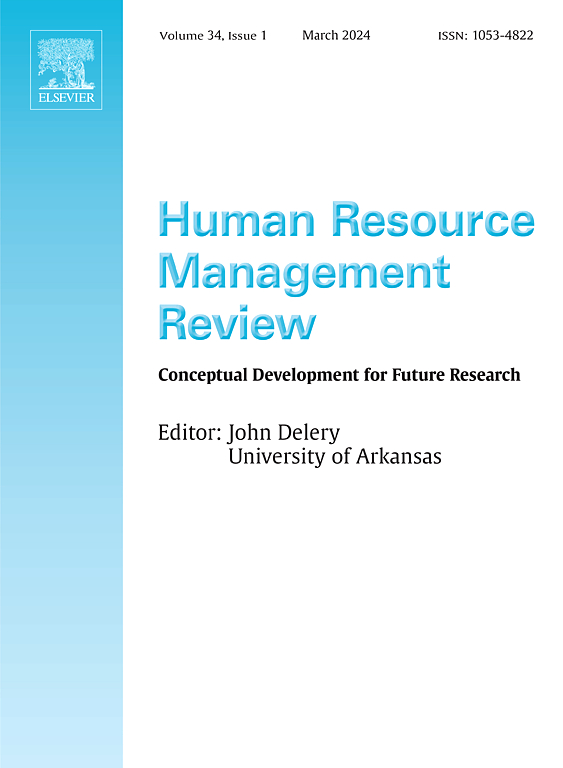Impact-driven scholar, reflective practitioner, or pracademic? Conceptualizing hybrid roles to bridge the research-practice gap in HRM
IF 13
1区 管理学
Q1 MANAGEMENT
引用次数: 0
Abstract
Bridging the gap between theoretical concepts relating to human resource management (HRM) and practical application of research insights is essential for creating important, relevant, and therefore high impact management theories about work and organizations. Pracademics, who actively participate in both research and practice activities, cross boundaries between domains, so play a critical role in bringing theories into practice. However, the role of pracademics is conceptually underdeveloped and ambiguous, limiting our understanding of how actors engage in bridging the research-practice divide. We propose a continuum of research-practice roles, recognizing that hybrid roles are often fluid in nature. We explain how hybrid professionals hold different identities; as impact-driven scholars, reflective practitioners, or pracademics. These roles have implications for individuals' activities, identity work, career, and collaboration. Drawing on three contemporary challenges in HRM, we illustrate how hybrid professionals can align HRM theory and practice and help close the research-practice gap. As well as theoretical and managerial implications, we also highlight implications of the continuum of roles for policy makers and funders.
影响驱动型学者,反思型从业者,还是实践型学者?概念化混合角色以弥合人力资源管理研究与实践的差距
弥合与人力资源管理(HRM)相关的理论概念与研究见解的实际应用之间的差距,对于创建有关工作和组织的重要、相关且因此具有高影响力的管理理论至关重要。学者积极参与研究和实践活动,跨越领域的界限,在将理论转化为实践方面发挥着至关重要的作用。然而,学者的作用在概念上是不发达的和模糊的,限制了我们对行动者如何参与弥合研究-实践鸿沟的理解。我们提出了一个连续的研究实践角色,认识到混合角色往往是流动的性质。我们解释了混合专业人士如何拥有不同的身份;作为影响驱动的学者,反思的实践者,或学者。这些角色对个人的活动、身份、工作、职业和协作都有影响。借鉴人力资源管理中的三个当代挑战,我们说明了混合专业人员如何将人力资源管理理论与实践结合起来,并帮助缩小研究与实践的差距。除了理论和管理方面的影响外,我们还强调了政策制定者和资助者角色连续性的影响。
本文章由计算机程序翻译,如有差异,请以英文原文为准。
求助全文
约1分钟内获得全文
求助全文
来源期刊

Human Resource Management Review
MANAGEMENT-
CiteScore
20.20
自引率
7.00%
发文量
0
审稿时长
48 days
期刊介绍:
The Human Resource Management Review (HRMR) is a quarterly academic journal dedicated to publishing scholarly conceptual and theoretical articles in the field of human resource management and related disciplines such as industrial/organizational psychology, human capital, labor relations, and organizational behavior. HRMR encourages manuscripts that address micro-, macro-, or multi-level phenomena concerning the function and processes of human resource management. The journal publishes articles that offer fresh insights to inspire future theory development and empirical research. Critical evaluations of existing concepts, theories, models, and frameworks are also encouraged, as well as quantitative meta-analytical reviews that contribute to conceptual and theoretical understanding.
Subject areas appropriate for HRMR include (but are not limited to) Strategic Human Resource Management, International Human Resource Management, the nature and role of the human resource function in organizations, any specific Human Resource function or activity (e.g., Job Analysis, Job Design, Workforce Planning, Recruitment, Selection and Placement, Performance and Talent Management, Reward Systems, Training, Development, Careers, Safety and Health, Diversity, Fairness, Discrimination, Employment Law, Employee Relations, Labor Relations, Workforce Metrics, HR Analytics, HRM and Technology, Social issues and HRM, Separation and Retention), topics that influence or are influenced by human resource management activities (e.g., Climate, Culture, Change, Leadership and Power, Groups and Teams, Employee Attitudes and Behavior, Individual, team, and/or Organizational Performance), and HRM Research Methods.
 求助内容:
求助内容: 应助结果提醒方式:
应助结果提醒方式:


